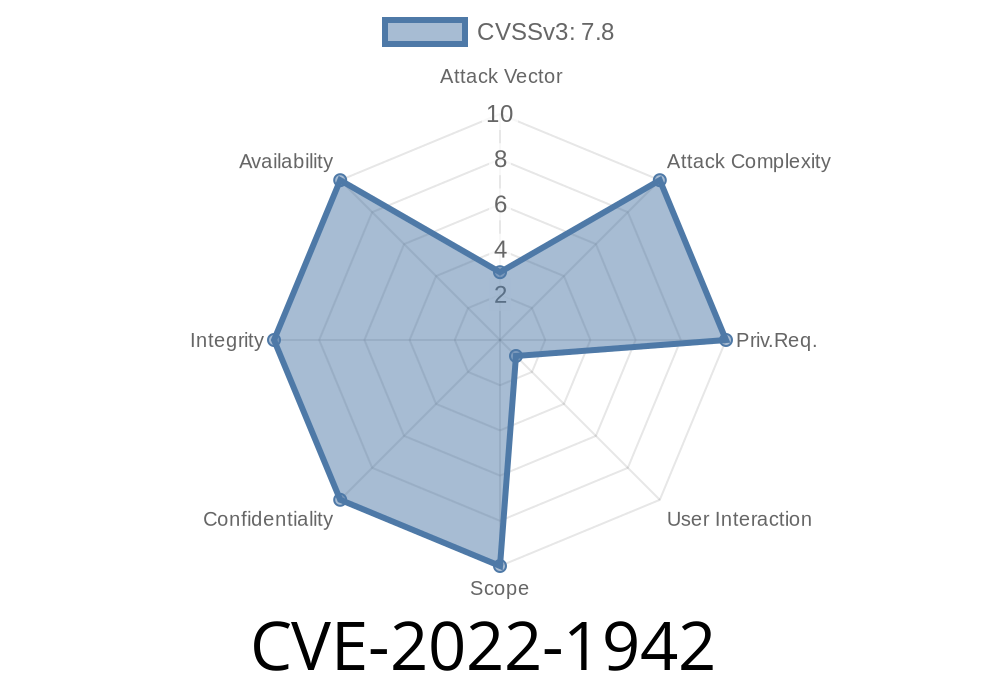Vim is one of the world's most popular text editors, beloved by programmers, sysadmins, and everyday users. However, like any complex software, it’s not immune to security issues. In 2022, a significant vulnerability was discovered: CVE-2022-1942, a heap-based buffer overflow in the Vim editor. This bug affects Vim versions prior to 8.2, and, if exploited, can potentially allow attackers to crash Vim or even run malicious code.
In this post, we’ll break down the details of CVE-2022-1942, step through how the bug works, describe a basic proof-of-concept exploit, and show you simple code snippets to understand the exploit. Finally, we’ll provide original references for more research.
Type of vulnerability: Heap-based Buffer Overflow
- Affected software: Vim (https://github.com/vim/vim), all versions prior to 8.2
Severity level: High
A buffer overflow is a classic software flaw. It happens when a program writes more data to a buffer, or block of memory, than it was designed to hold. A heap-based buffer overflow specifically affects the “heap” (or dynamic memory) used by the program for variable and buffer allocation at runtime.
In Vim, CVE-2022-1942 could be triggered by processing crafted Vim scripts or modelines that cause the editor to mishandle memory. Attackers could leverage it to crash Vim or, under certain conditions, run arbitrary code.
Let’s See the Vulnerable Code
The vulnerable code is related to how Vim handles modelines and buffer allocation. Although the precise code affected is deep in Vim’s complex codebase, here’s a simplified illustrative snippet to understand the type of flaw:
// Example: vulnerable code that might resemble old Vim code
void copy_to_buffer(char *input) {
char *buffer = malloc(128); // allocate 128 bytes
strcpy(buffer, input); // UNSAFE: if input > 128 bytes, buffer overflow!
}
Vim allocates a buffer for a line of a fixed size.
- If a file contains a modeline that's *longer* than the buffer, and boundary checks are omitted or incorrect, Vim will write beyond the buffer.
What does this mean in practice? If a user opens a file containing a specially crafted modeline, Vim may overflow the buffer, corrupting the heap.
Create a text file (evil.txt) with a very long modeline. Here's a proof-of-concept modeline
# vim: set ft=sh :aaaaaaaaaaaaaaaaaaaaaaaaaaaaaaaaaaaaaaaaaaaaaaaaaaaaaaaaaaaaaaaaaaaaaaaaaaaaaaaaaaaaaaaaaaaaaaaaaaaaaaaaaaaaaaaaaaaaaaaaaaaaaaaaaaaaaaaaaaaaaaaaaaaaaaa
Open the File with Vim Pre-8.2
vim evil.txt
Result:
If you use a version of Vim prior to 8.2 *without* the patch, the application can crash, hang, or possibly execute injected code.
*Note: This is for educational demonstration only. Use on non-production, non-sensitive environments!*
Safely allocate enough space.
// Fixed code example
void safe_copy_to_buffer(char *input) {
size_t buffer_size = 128;
char *buffer = malloc(buffer_size);
strncpy(buffer, input, buffer_size - 1); // safe copy
buffer[buffer_size - 1] = '\';
}
References
- Vim’s Security Advisory on GHSA-h7xh-xmmf-v93c
- Official CVE-2022-1942 Listing on NVD
- Vim Commit Fixing CVE-2022-1942
- Exploit Proof-of-Concept Discussion
Conclusion
CVE-2022-1942 is a classic reminder that even popular, open-source tools like Vim can harbor serious vulnerabilities. Always update to the latest secure release, disable risky features when possible, and watch for security advisories. If you use Vim, make sure you’re using version 8.2 or above to stay safe!
Timeline
Published on: 05/31/2022 14:15:00 UTC
Last modified on: 08/26/2022 18:53:00 UTC
